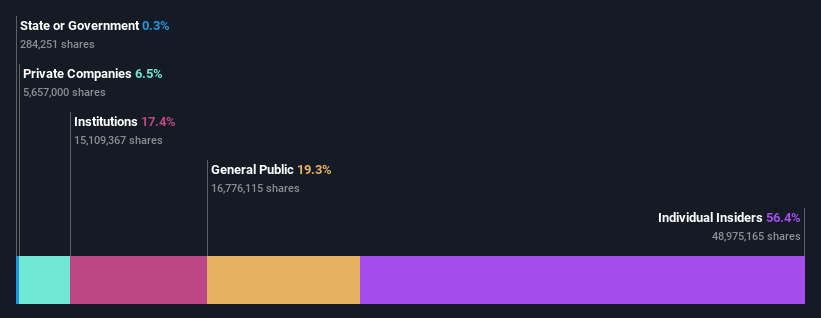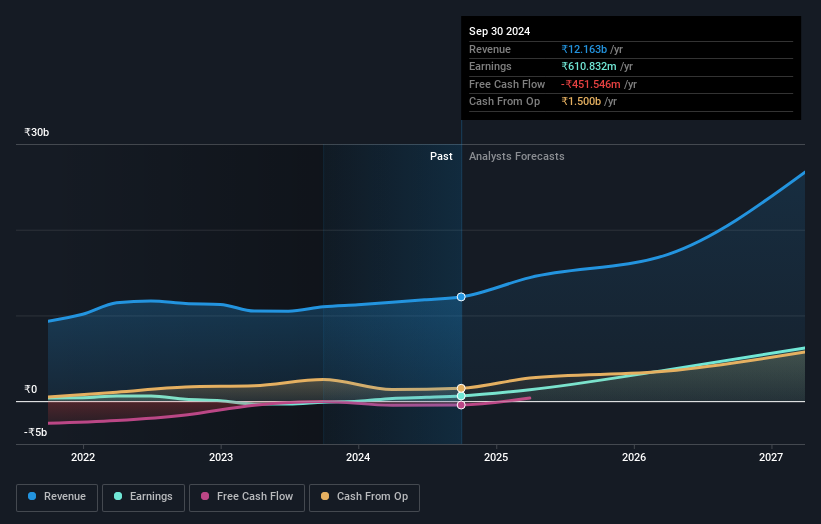Despite selling recently, Shilpa Medicare Limited (NSE:SHILPAMED) insiders own 56% stake and recent decline might have cost them

Key Insights
- Insiders appear to have a vested interest in Shilpa Medicare's growth, as seen by their sizeable ownership
- The top 13 shareholders own 51% of the company
- Recent sales by insiders
Every investor in Shilpa Medicare Limited (NSE:SHILPAMED) should be aware of the most powerful shareholder groups. The group holding the most number of shares in the company, around 56% to be precise, is individual insiders. That is, the group stands to benefit the most if the stock rises (or lose the most if there is a downturn).
Even though insiders have sold shares recently, the group owns the most numbers of shares in the company. Following last week's 14% decline in share price, the group also suffered the most losses.
Let's delve deeper into each type of owner of Shilpa Medicare, beginning with the chart below.
See our latest analysis for Shilpa Medicare

What Does The Institutional Ownership Tell Us About Shilpa Medicare?
Many institutions measure their performance against an index that approximates the local market. So they usually pay more attention to companies that are included in major indices.
Shilpa Medicare already has institutions on the share registry. Indeed, they own a respectable stake in the company. This suggests some credibility amongst professional investors. But we can't rely on that fact alone since institutions make bad investments sometimes, just like everyone does. It is not uncommon to see a big share price drop if two large institutional investors try to sell out of a stock at the same time. So it is worth checking the past earnings trajectory of Shilpa Medicare, (below). Of course, keep in mind that there are other factors to consider, too.

Hedge funds don't have many shares in Shilpa Medicare. The company's CEO Vishnukanth Bhutada is the largest shareholder with 8.9% of shares outstanding. Dharmavati Bhutada is the second largest shareholder owning 7.2% of common stock, and Ravi Inani holds about 4.6% of the company stock.
A closer look at our ownership figures suggests that the top 13 shareholders have a combined ownership of 51% implying that no single shareholder has a majority.
While it makes sense to study institutional ownership data for a company, it also makes sense to study analyst sentiments to know which way the wind is blowing. While there is some analyst coverage, the company is probably not widely covered. So it could gain more attention, down the track.
Insider Ownership Of Shilpa Medicare
While the precise definition of an insider can be subjective, almost everyone considers board members to be insiders. Management ultimately answers to the board. However, it is not uncommon for managers to be executive board members, especially if they are a founder or the CEO.
I generally consider insider ownership to be a good thing. However, on some occasions it makes it more difficult for other shareholders to hold the board accountable for decisions.
It seems that insiders own more than half the Shilpa Medicare Limited stock. This gives them a lot of power. So they have a ₹35b stake in this ₹62b business. It is good to see this level of investment. You can check here to see if those insiders have been buying recently.
General Public Ownership
The general public-- including retail investors -- own 19% stake in the company, and hence can't easily be ignored. This size of ownership, while considerable, may not be enough to change company policy if the decision is not in sync with other large shareholders.
Private Company Ownership
It seems that Private Companies own 6.5%, of the Shilpa Medicare stock. It's hard to draw any conclusions from this fact alone, so its worth looking into who owns those private companies. Sometimes insiders or other related parties have an interest in shares in a public company through a separate private company.
Next Steps:
It's always worth thinking about the different groups who own shares in a company. But to understand Shilpa Medicare better, we need to consider many other factors. Take risks for example - Shilpa Medicare has 1 warning sign we think you should be aware of.
Ultimately the future is most important. You can access this free report on analyst forecasts for the company.
NB: Figures in this article are calculated using data from the last twelve months, which refer to the 12-month period ending on the last date of the month the financial statement is dated. This may not be consistent with full year annual report figures.
New: Manage All Your Stock Portfolios in One Place
We've created the ultimate portfolio companion for stock investors, and it's free.
• Connect an unlimited number of Portfolios and see your total in one currency
• Be alerted to new Warning Signs or Risks via email or mobile
• Track the Fair Value of your stocks
Have feedback on this article? Concerned about the content? Get in touch with us directly. Alternatively, email editorial-team (at) simplywallst.com.
This article by Simply Wall St is general in nature. We provide commentary based on historical data and analyst forecasts only using an unbiased methodology and our articles are not intended to be financial advice. It does not constitute a recommendation to buy or sell any stock, and does not take account of your objectives, or your financial situation. We aim to bring you long-term focused analysis driven by fundamental data. Note that our analysis may not factor in the latest price-sensitive company announcements or qualitative material. Simply Wall St has no position in any stocks mentioned.
About NSEI:SHILPAMED
Shilpa Medicare
Manufactures and sells active pharmaceutical ingredients (APIs), finished dosage formulations, biosimilars, recombinant albumin in India, the United States, Europe, and internationally.
High growth potential with excellent balance sheet.
Similar Companies
Market Insights
Community Narratives



